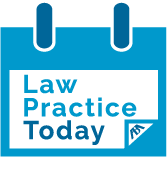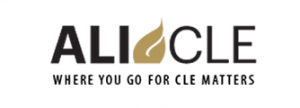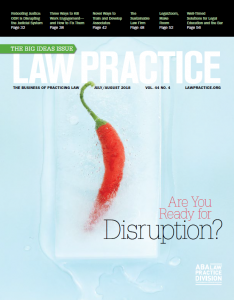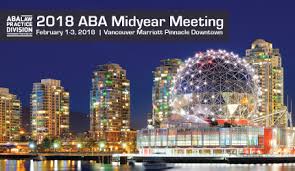ABA Journal – Trashed by Clients Online?
 In the June/July 2020 issue of the ABA Journal, Cynthia Sharp asks me about how attorneys can best respond to negative online reviews in “Trashed by Clients Online? Ethically responding to negative reviews,” a subject that I’ve discussed with many attorneys and clients over the years.
In the June/July 2020 issue of the ABA Journal, Cynthia Sharp asks me about how attorneys can best respond to negative online reviews in “Trashed by Clients Online? Ethically responding to negative reviews,” a subject that I’ve discussed with many attorneys and clients over the years.
It is probably the topic that brings me the most questions during my marketing ethics-related CLE programs. In a recent webinar for the American Legal Institute (ALI), Ethically Navigating the Three Rs: Lawyer Ratings, Rankings, and Reviews, I focus solely on this area as it relates to attorney advertising. And I’ve written about the subject matter multiple times in my ABA Law Practice magazine column as well. Mostly, because unlike many areas of attorney marketing ethics, this one is quite “real” to many lawyers that have been bitten by disgruntled former clients, or unhappy ex-employees, shady competitors or just someone that plain doesn’t like you. The combustible mix of not being able to opt-out of the review process and the sheer fact that this stuff can be highly visible in your online portfolio can be deadly. And many attorneys have responded poorly—and violated ethics rules in the process.
The power of the online review—on Google, Yelp, Facebook, or numerous sites that are legal-specific—has grown exponentially in recent years. Early on, the issues often stemmed from reviews on legal site Avvo (which rewarded attorneys for having reviews in their profiles), and Yelp—the initial home of choice for the disgruntled…there is nothing like being ripped by a Yelper. Facebook could be especially critical to the consumer-facing law practice. But it was really the elevation of reviews on Google that increased the potential for reward and damage. If you think about the evolution of Google in the online marketplace—from sponsored results to adwords; SEO spends on organic results, local/mapped searching and various efforts at developing a social media component (mostly without success), the incorporation of Google Reviews and the related visibility in a search result puts a spotlight on them for the end-user and adds another concern for reputation management of your online portfolio.
 Marketing Attorney Blog
Marketing Attorney Blog



 Of all the topics I have presented on in 22+ years of teaching law marketing ethics CLEs, my program on navigating the Three Rs—Ratings, Rankings and Reviews—may be my favorite. If you need your ethics credit, find your law firm often enveloped in dealing with the 3 Rs, or just enjoy the subject matter, join me for this live webcast on Tuesday, October 29, 2019 from 1-2 pm ET.
Of all the topics I have presented on in 22+ years of teaching law marketing ethics CLEs, my program on navigating the Three Rs—Ratings, Rankings and Reviews—may be my favorite. If you need your ethics credit, find your law firm often enveloped in dealing with the 3 Rs, or just enjoy the subject matter, join me for this live webcast on Tuesday, October 29, 2019 from 1-2 pm ET.

 Whenever I pass a roadside diner promising something like “world’s best cherry pie,” I think about lawyer advertising restrictions. Because no law firm or lawyer could tout themselves as the best or greatest—and many of the taglines, phrases and symbols used to market products and services to consumers are restricted or outright prohibited in the legal profession.
Whenever I pass a roadside diner promising something like “world’s best cherry pie,” I think about lawyer advertising restrictions. Because no law firm or lawyer could tout themselves as the best or greatest—and many of the taglines, phrases and symbols used to market products and services to consumers are restricted or outright prohibited in the legal profession. Recently, I had the privilege of serving on a panel at the American Bar Association’s Law Practice Division continuing legal education program on the ethics of virtual and multi-jurisdictional lawyering in Santa Fe, New Mexico. The program was co-sponsored by the State Bar of New Mexico, and took place on May 18, 2018 at the Inn and Spa at Loretto.
Recently, I had the privilege of serving on a panel at the American Bar Association’s Law Practice Division continuing legal education program on the ethics of virtual and multi-jurisdictional lawyering in Santa Fe, New Mexico. The program was co-sponsored by the State Bar of New Mexico, and took place on May 18, 2018 at the Inn and Spa at Loretto.